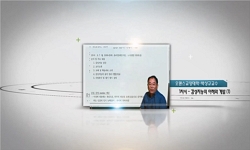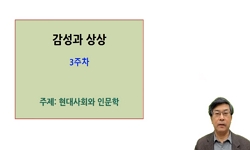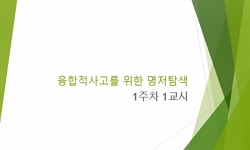Multiperspectivity in German history education theory can be explained in three different dimensions. They are 1. multiperspectivity of the people of the past that can be observed in historical records and artifacts, 2. multiperspectivity of the resea...
http://chineseinput.net/에서 pinyin(병음)방식으로 중국어를 변환할 수 있습니다.
변환된 중국어를 복사하여 사용하시면 됩니다.
- 中文 을 입력하시려면 zhongwen을 입력하시고 space를누르시면됩니다.
- 北京 을 입력하시려면 beijing을 입력하시고 space를 누르시면 됩니다.
부가정보
다국어 초록 (Multilingual Abstract)
Multiperspectivity in German history education theory can be explained in three different dimensions. They are 1. multiperspectivity of the people of the past that can be observed in historical records and artifacts, 2. multiperspectivity of the researcher and the historian in relations to their observation of historical facts, i.e. arguments 3. multiperspectivity in the sense that each student of history forms his individual opinion on a particular historical fact, i.e. multiple opinions. German history education theory demands that history classes be undertaken in the same way as a professional historian would study his discipline, which means that the students must experience the understanding of history in a procedural manner. It is accepted that students must take into account the principle of multiperspectivity in order to achieve objectivity in historical thinking.
The history education guidelines of German state governments regard the objective of history education as the formation of reflective historical consciousness. Reflective historical consciousness can be developed as students attain ‘historical competence.’ Historical competence can be divided into professional competence (Sachkompetenz), methodological competence and judgement competence. Judgement competence is again divided into situational judgement competence and value judgement competence. Historical value judgement competence is the highest competence that students of history must attain. The history education guidelines of the German state governments which have been published after the early 2000s are labelled ‘competence-oriented history education guidelines,’ and they stipulate the ‘competence’ that need to be attained by students during their history classes in each school year. The learning of multiperspectivity is emphasized in order to develop these competences which are vital in the formation of reflective historical consciousness.
History classes that apply multiperspectivity have the objective of developing competence of adopting perspectives and empathy, situational judgement competence and value judgement competence. In order to facilitate the development of competence related to adopting perspectives and empathy, ‘production-oriented’ or ‘action-oriented’ history classes are regarded as being appropriate. This article has introduced the module ‘Columbus and Its Results’ of the 8th grade as a sample class. This module’s most important objective is to develop the individual student’s historical judgement competence. Only by developing his individual historical judgement competence can the student attain the necessary political acumen to actively promote the ideals of democracy and human rights.
국문 초록 (Abstract)
독일의 역사교육 이론에서 다원적 관점은 세 가지의 서로 다른 차원을 의미한다. 그것은 1. 사료와 유물 속에 포함되어 있는 과거의 인간들의 다원적 관점, 2. 역사적 사실에 대한 후대의 관...
독일의 역사교육 이론에서 다원적 관점은 세 가지의 서로 다른 차원을 의미한다. 그것은 1. 사료와 유물 속에 포함되어 있는 과거의 인간들의 다원적 관점, 2. 역사적 사실에 대한 후대의 관찰자인 연구자와 역사가의 다원적 관점, 즉 논쟁, 3. 학습자들이 하나의 역사적 사실에 대하여 각자의 의견을 형성하는 의미에서의 다원적 관점, 즉 복수의 의견들의 차원이다. 독일의 역사교육 이론은 역사수업이 원칙적으로 전문역사가의 작업방식과 유사한 방법으로 이루어져야만 한다고 하며, 이것은 학생들이 역사수업에서 역사적 인식을 하나의 ‘과정’으로서 경험하여야만 한다는 것을 의미한다. 학습자들은 다원적 관점의 원칙을 고려함으로써만이 역사적 사고에서 객관성에 도달할 수 있다고 본다.
주정부들의 교수계획은 역사교육의 목표가 반성적reflected 역사의식의 형성에 있다고 본다. 반성적 역사의식은 학생들이 ‘역사적 능력 historical competence’을 습득하면서 계발될 수 있다고 본다. 역사적 능력은 ‘사실능력 Sachkompetenz’, ‘방법능력’, ‘판단능력’으로 구분된다. 판단능력은 다시 ‘상황판단 능력’과 ‘가치판단 능력’으로 구분된다. 역사적 가치판단 능력은 학생들이 습득해야만 할 최고의 능력이다. 2000년대 초반 이후에 출간된 독일 주정부들의 교수계획은 ‘능력지향적 교수계획 competence oriented’이라고 명명되고 있는데, 그것은 역사수업에서 학생들이 특정한 학년마다 성취하여야 할 ‘능력’을 규정하고 있다. 다원적 관점의 학습은 반성적 역사의식을 위해서는 필수적인 이러한 능력의 계발을 위해서 강조되고 있다.
다원적 관점의 역사수업은 ‘관점의 수용 Perspektivenyebernahme Empathy’ 능력과 상황판단능력, 가치판단 능력의 계발에 그 목표가 놓여진다. ‘생산지향적인’ 또는 ‘행동지향적인’ 역사수업이 관점 수용능력을 개발을 위해서는 적합한 수업방식이라고 본다. 여기에서는 8학년에 해당되는 ‘콜럼버스와 그 결과’라는 수업단위를 하나의 수업사례로 소개하였다. 이 수업단위에서의 최고의 목표는 학생들 개인 각자의 역사적 판단능력의 계발이다. 학생들은 스스로의 역사적 판단능력을 발전시킴으로써 현재 사회에서의 민주주의와 인권의 가치를 위해 적극적으로 행동할 수 있는 정치적 교양을 갖출 수 있다.
참고문헌 (Reference)
1 Bernhardt, M., "“Wer isst schon Menschenfleisch? - Pfui Teufel!” Diagnose von Perspektivenuebernahme" (139) : 40-45, 2011
2 Huhn, J., "Vergangenes sehen. Perspektivitaet im historischen Lernens. Perspektivitaet im Prozess historischen Lernens. Theorie und Unterrichtspraxis von der Grundschule bis zur Sekundarstufe 2" 1995
3 Neuhaus, V., "Typen multiperspektivischen Erzaelens" 1971
4 Memminger, J., "Schueler schreiben Geschichte. Kreatives Schreiben im Geschichtsunterricht zwischen Fiktionalitaet und Faktizitaet" 2007
5 Pandel, H.-J., "Quelleninterpretationen. Die schriftliche Quelle im Geschichtsunterricht" 2000
6 Konrad, F., "Perspektivenuebernahme, Sachurteil und Werturteil. Drei zentrale Kompetenzen im Umgang mit Geschichte" (139) : 2-11, 2011
7 Hartmann, U., "Perspektivenuebernahme als Kompetenz fuer den Geschichtsunterricht. Theoretische und empirische Zusammenhaenge zwischen fachspezifischen und sozio-kognitiven Schuelermerkmalen" (12) : 321-342, 2009
8 Bergmann, K., "Multiperspektivitaet. Geschichte selber denken" 2008
9 Negt, O., "Kindheit und Schule in einer Welt der Umbrueche" 1997
10 Ruesen, J., "Historisches Lernen" 1994
1 Bernhardt, M., "“Wer isst schon Menschenfleisch? - Pfui Teufel!” Diagnose von Perspektivenuebernahme" (139) : 40-45, 2011
2 Huhn, J., "Vergangenes sehen. Perspektivitaet im historischen Lernens. Perspektivitaet im Prozess historischen Lernens. Theorie und Unterrichtspraxis von der Grundschule bis zur Sekundarstufe 2" 1995
3 Neuhaus, V., "Typen multiperspektivischen Erzaelens" 1971
4 Memminger, J., "Schueler schreiben Geschichte. Kreatives Schreiben im Geschichtsunterricht zwischen Fiktionalitaet und Faktizitaet" 2007
5 Pandel, H.-J., "Quelleninterpretationen. Die schriftliche Quelle im Geschichtsunterricht" 2000
6 Konrad, F., "Perspektivenuebernahme, Sachurteil und Werturteil. Drei zentrale Kompetenzen im Umgang mit Geschichte" (139) : 2-11, 2011
7 Hartmann, U., "Perspektivenuebernahme als Kompetenz fuer den Geschichtsunterricht. Theoretische und empirische Zusammenhaenge zwischen fachspezifischen und sozio-kognitiven Schuelermerkmalen" (12) : 321-342, 2009
8 Bergmann, K., "Multiperspektivitaet. Geschichte selber denken" 2008
9 Negt, O., "Kindheit und Schule in einer Welt der Umbrueche" 1997
10 Ruesen, J., "Historisches Lernen" 1994
11 Sauer, M., "Historische Perspektivenuebernahme. Methodische Anregungen" (139) : 12-17, 2011
12 Bergmann, K., "Handbuch Methoden im Geschichtsunterricht" 65-77, 2007
13 Bergmann, K., "Handbuch Geschichtsdidaktik" Seelze-Velber 301-304, 1997
14 Ruesen, J., "Handbuch Geschichtsdidaktik" Seelze-Velber 301-304, 1997
15 Bergmann, K., "Geschichtsunterricht im vereinten Deutschland. Auf der Suche nach Neuorientierung, 2Bde(Teil 1)" 80-92, 1991
16 Stolz, P., "Die Entdeckung der neuen Welt. Kolumbus und die Folgen. Multiperspektivischer Geschichtsunterricht: Eine Unterrichtsreihe fuer die 7. Klasse mit Geschichte plus" Cornelsen Verlag 2006
동일학술지(권/호) 다른 논문
-
이주의 장소로서 ‘하이마트(Heimat)’의 재발견: 독일 ‘이주민 밀집지역’에서의 박물관과 정체성 정치
- 한국독일사학회
- 이용일
- 2016
- KCI등재
-
문화적 ‘타자’ 이해: 독일 가톨릭 신학자 될링어 (Ignaz von Döllinger, 1799-1890)의 유대 관을 중심으로
- 한국독일사학회
- 김필영
- 2016
- KCI등재
-
독일연방공화국의 (역사)교과서 검인정체제: 국가적 통제에서 자율결정으로
- 한국독일사학회
- 김유경
- 2016
- KCI등재
-
한국 역사교과서에 나타난 독일사를 보는 방식: 7차 교과과정과 2009년 개정 교육과정 「세계사 교과서」의 독일사 서술에 대한 비교를 중심으로
- 한국독일사학회
- 최선아
- 2016
- KCI등재
분석정보
인용정보 인용지수 설명보기
학술지 이력
| 연월일 | 이력구분 | 이력상세 | 등재구분 |
|---|---|---|---|
| 2027 | 평가예정 | 재인증평가 신청대상 (재인증) | |
| 2021-01-01 | 평가 | 등재학술지 유지 (재인증) |  |
| 2018-01-01 | 평가 | 등재학술지 유지 (등재유지) |  |
| 2015-01-01 | 평가 | 등재학술지 유지 (등재유지) |  |
| 2011-01-01 | 평가 | 등재학술지 유지 (등재유지) |  |
| 2008-01-01 | 평가 | 등재학술지 선정 (등재후보2차) |  |
| 2007-01-01 | 평가 | 등재후보 1차 PASS (등재후보1차) |  |
| 2005-01-01 | 평가 | 등재후보학술지 선정 (신규평가) |  |
학술지 인용정보
| 기준연도 | WOS-KCI 통합IF(2년) | KCIF(2년) | KCIF(3년) |
|---|---|---|---|
| 2016 | 0.46 | 0.46 | 0.34 |
| KCIF(4년) | KCIF(5년) | 중심성지수(3년) | 즉시성지수 |
| 0.35 | 0.28 | 0.811 | 0.58 |





 스콜라
스콜라






